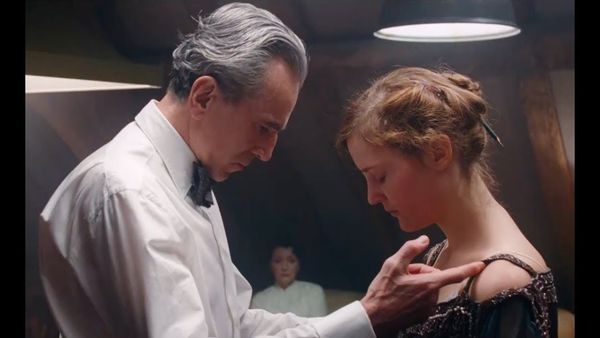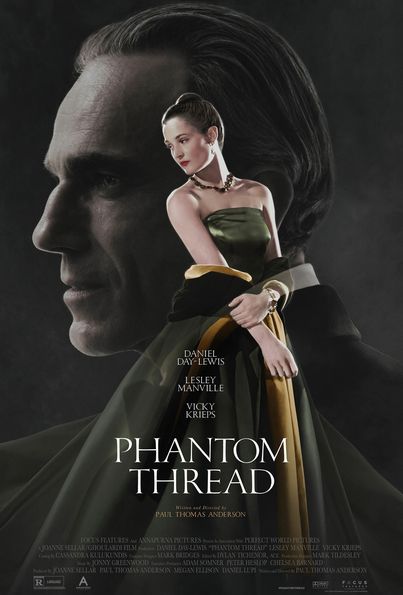Phantom Thread (2017)

Phantom Thread, directed by Paul Thomas Anderson and released in 2017, is a mesmerizing exploration of love, obsession, and the intricacies of human relationships set against the backdrop of the fashion world in 1950s London. Starring Daniel Day-Lewis as renowned dressmaker Reynolds Woodcock and Vicky Krieps as his muse and lover, Alma, the film weaves a rich tapestry of artistry, desire, and power dynamics.
The story follows Reynolds Woodcock, a meticulous and celebrated couturier who lives a life dedicated to his craft. His world is one of elegance and precision, where every detail matters, from the fabrics he chooses to the women who model his creations. However, beneath the surface of this glamorous life lies a man whose obsessive nature and relentless pursuit of perfection reveal deeper vulnerabilities. Day-Lewis delivers a masterful performance, embodying Reynolds with both charm and a sense of fragility.

Alma enters Reynolds’s life as a waitress, and her allure quickly captivates him. Their relationship begins as a passionate romance, with Alma becoming both his muse and a source of inspiration. However, as the story unfolds, it becomes clear that their dynamic is not merely one of love and admiration but also one of control and manipulation. Alma’s desire for independence clashes with Reynolds’s possessive nature, leading to a complex and often turbulent relationship.

The film’s cinematography, crafted by Anderson himself, is visually stunning. Each frame is meticulously composed, reflecting the precision of Reynolds’s work as a designer. The use of light and shadow creates an intimate atmosphere that enhances the emotional weight of the narrative. The settings, from the bustling streets of London to the opulent interiors of Reynolds’s home and workshop, further immerse viewers in the world of high fashion.

The score, composed by Jonny Greenwood, adds another layer of depth to the film. Its haunting melodies underscore the tension and beauty of the story, enhancing the emotional resonance of key moments. The music mirrors the complexities of Reynolds and Alma’s relationship, evoking both passion and unease.

At its core, Phantom Thread is a film about the complexities of love and the sacrifices one makes for it. As Reynolds and Alma navigate their tumultuous relationship, viewers are invited to reflect on the nature of power and vulnerability in romantic partnerships. Their interactions are marked by a constant push and pull, as each character seeks to assert their identity while grappling with their feelings for one another.
The film’s pacing is deliberate, allowing for moments of introspection and character development. This measured approach invites audiences to engage deeply with the characters’ emotions and motivations, creating a rich narrative experience. The dialogue is sharp and evocative, revealing the nuances of their relationship and the intricacies of their personalities.
Phantom Thread received critical acclaim upon its release, praised for its exceptional performances, exquisite craftsmanship, and thought-provoking themes. Daniel Day-Lewis’s portrayal of Reynolds earned him yet another Academy Award nomination, while Krieps’s performance as Alma was lauded for its depth and complexity.
In conclusion, Phantom Thread is a beautifully crafted film that delves into the complexities of love, creativity, and the human condition. Through its stunning visuals, captivating performances, and rich thematic exploration, the film invites viewers to reflect on the nature of desire and the sacrifices made in the name of love. As Reynolds and Alma’s relationship unfolds, audiences are left with a haunting reminder of the delicate balance between passion and control, artistry and obsession, ultimately creating a cinematic experience that lingers long after the credits roll.











